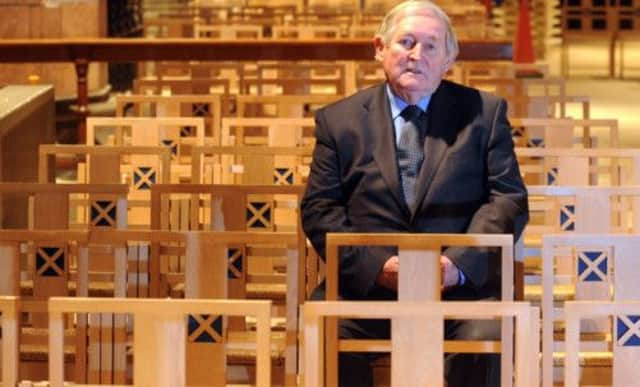Business interview: Sir Angus Grossart


Speaking in a featureless, boxy meeting room in Edinburgh. he continues: “You should put that in the article.”
Nevertheless, the renowned Scottish merchant banker, 76, is narrowing his focus of activities.
Advertisement
Hide AdAdvertisement
Hide AdEarlier this month, and after 25 years, he stepped down from the board of Sir David Murray’s metals business, Murray International Holdings, following a long exodus of directors including divisional directors Graeme Hill, Donald Wilson, and Sir David’s son, David Murray junior, who continues to head the family investment office, Murray Capital.
But the man who in 1969 founded the merchant bank which bears his name, is still driven by his passions.
For example, he remains heavily involved with the arts. Having last year relinquished the chairmanship of the National Museums of Scotland, in April he took on the chair of the Burrell Renaissance group, which is overseeing the refurbishment of the gallery that hosts the eclectic Burrell Collection in Glasgow.
He is also chairman of Scotland’s oldest auction house Lyon & Turnbull. It was founded in 1826, but acquired by a group of auctioneers in 1999 – a deal, of course, supported by Grossart. His involvement with some of Scotland’s most prominent business people is a long list which includes Kwik-Fit founder Sir Tom Farmer, Aberdeen oilman Sir Ian Wood, , and Stagecoach bus and rail company co-founder Sir Brian Souter.
But the day I meet him he was there to speak about his work as chair of the Scottish Futures Trust (SFT), the procurement body which streamlines public sector development projects and brings in private sector investment.
The body was the brainchild of Grossart in the wake of the failure of the discredited PPI/PPF system. The SFT has an arm’s length independence from government and is led by the civil engineer by training, Barry White.
“A problem with procurement in the past has been relative dysfunctionality, the inability to achieve real co-operation,” muses Grossart.
But since the advent of the SFT five years ago, it has amassed the £2.6 billion Non-Profit Distributing (NPD) programme which packages investments in large-scale construction projects such as hospitals, colleges, secondary schools and roads. It draws in private investors paid out of local authority and Scottish Government budgets over the long term.
Advertisement
Hide AdAdvertisement
Hide AdIt has advised local authorities on unusual funding mechanisms such as tax incremental financing (TIF). Councils in Glasgow and Falkirk have signed up and begun spending the £140 million they have raised, which will be paid out of future tax receipts thanks to the improvements that have already been funded.
A housing finance scheme has already built some 1,000 houses for mid-market rent. The SFT is also helping to usher in carbon efficient LED lighting in towns and cities across Scotland – fundable because the new lighting represents such a cost saving to run. Two local authorities, East and West Dunbartonshire Councils, have signed up to replace street lighting with light emitting diodes and the rest could start rolling these out across the country.
Grossart’s satisfaction is now evident, but he admits it hasn’t been easy. “This is a comprehensive and different approach, started with a relative clean sheet,” he says. “We have had to develop new approaches. We are a highly professional team, employing 60 people now.
“It has taken time and patience. What we have done is create a model they are following in London and a number of other areas.”
He likens the SFT’s effort to “business as unusual”. But he talks about how his arrival in the public sector was a bit of a culture shock for local authorities. Last week, the body pointed to the opening of two schools that had been procured together in a package, saving the public purse £4m on the £65m deal.
It hasn’t been an easy process to persuade local authorities that the SFT is working in their best interests.
Grossart likens reaction to his arrival into the public sector funding arena “like Lenin stepping out of the train at St Petersburg”.
The military history reference is typical for Grossart – he has previously said he prefers reading history to business books because “history’s a good textbook for understanding waves of change and maintaining perspective.”
Advertisement
Hide AdAdvertisement
Hide AdIt also harks back to his passing the baton of the National Museums chair to Bruce Minto, co-head of the law firm Dickson Minto. The theme was the Russian revolution, in honour of the blockbuster show at the National Museum last year on Catherine the Great.
“We have to be evangelical and revolutionary in our conviction in what we are doing. Then try to get a focus on decisions, action and delivery. That is the template for getting things done.
“We have occasional revolutionary tendencies which we are quite proud of. But you have to be patient.
“And retain a sense of humour.”
30-second CV
Born: 6 April, 1937, Lanarkshire
Education: Glasgow Academy; Glasgow University (MA 1958, LLB 1960); chartered accountant (1962).
First job: Selling toffee at a market stall at the Barras, in Glasgow. Practised for three years at Scottish Bar before launching investment bank Noble Grossart.
Other roles: Chairman Scottish Investment Trust, 1975-2003; director and later vice-chairman of Royal Bank of Scotland, 1982-2005.
Claims to fame: Was runner-up in the British Youth Golf Championship in 1957. Spent 25 years refurbishing his rural retreat, the 16th century Pitcullo Castle in Fife. His wife, Gay Grossart, is a highly acclaimed contemporary Scottish painter.
Famous quote: “My plan is to die of exhaustion, not of boredom.”